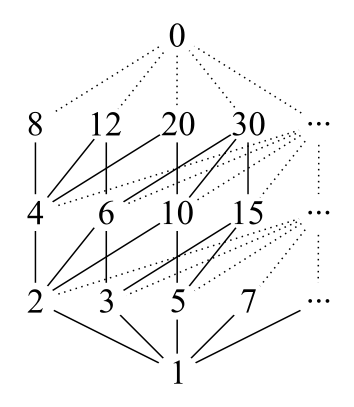"Double" Divisors
 If a three-digit number
a
b
c
has 28 positive divisors, how many positive divisors does the six-digit number
a
b
c
a
b
c
have?
If a three-digit number
a
b
c
has 28 positive divisors, how many positive divisors does the six-digit number
a
b
c
a
b
c
have?
The answer is 224.
This section requires Javascript.
You are seeing this because something didn't load right. We suggest you, (a) try
refreshing the page, (b) enabling javascript if it is disabled on your browser and,
finally, (c)
loading the
non-javascript version of this page
. We're sorry about the hassle.
6 solutions
Simple way:: 28 factors for abc. abcabc is 1001 x abc = 11 x 7 x 13 x abc. So Factors are 28 factors of abc + 28 of 7(abc) + 28 of 11(abc) + 28 of 13(abc) + + 28 of 7 x 11(abc) + 28 of 7 x 13(abc) + 28 of 13 x 11(abc) + 28 of 7 x 13x11(abc). That is 8 x 28 =224
Same approach as mine!
Impeccable approach!
good...i like your explanations...it's nice job. thx
Yes. A common mistake people made here is finding factors of 1 0 0 1 ∗ a b c
but when we reach to the point that abcabc= 1001 * (abc) and then we factorize 1001 and get abcabc = 13 * 11 * 7 (abc). we know that abc has 28 factors and 7, 13 and 11 are getting it to be 31 factors in the case of abcabc.according to me abcbabc should have 31 factors. plz correct me if i am wrong.
Log in to reply
the new factors of abcabc are not only 7 , 11 &13. All the 28 factors of abc are multiplied by each factor of 1001, i.e. 7 , 11 , 13 , 77 , 143 , 91 & 1001 , generating 196 new factors.
Hence 28 + 196 = 224 factors.
abcabc=(1000abc)+abc=1001abc=7x11x13xabc. So we know that abc got 28 positive divisors and we have to multiply this number by the exponents+1 of 7, 11 and 13 obtaining: 28x(2x2x2)=224
You have not proved that a b c is not divisible by 7 , 1 1 , 1 3 .
Log in to reply
You're right! I'm new to this type of exercises and I always forget to prove or demonstrate some cases..
if a number has prime factors of the form (a^x),(b^y),(c^z)......and so on then the number of factors are (x+1) (y+1) (z+1)
eg = 12 = (2^2) 3......therefore number of factors of 12 are (3 2)= 6
1) abcabc = 1001*abc
2) abcabc = 7 11 13*abc
3) 7 cannot be divisors of abc because if they were then the minimum value of abc would be abc = (2^6) * (3) * (7) = 1344 which is not a 3 digit number.
4) similary even 11and 13 cant be divisors of abc
5) therefore total divisors of abcabc are 28 + (2 2 2) = 224
Simple way:: 28 factors for abc. abcabc is 1001 x abc = 11 x 7 x 13 x abc. So Factors are 28 factors of abc + 28 of 7(abc) + 28 of 11(abc) + 28 of 13(abc) + + 28 of 7 x 11(abc) + 28 of 7 x 13(abc) + 28 of 13 x 11(abc) + 28 of 7 x 13x11(abc). That is 8 x 28 =224
By observation, the number of positive divisors to any number abcabc is 8 times the number of positive divisors to a number abc. So if abc has 28 divisors, abcabc has 28x8=224 divisors.
NO
>
no. not necessarily. for example you can see the case of 104 and 104104 etc.
abcabc=1001 abc so number of divisors of abcabc is 28 2 2 2 as 1001 has 3 prime factors 7,11 and 13 each used once only.
Note that 2 8 = 2 × 1 4 = 4 × 7 = 2 × 2 × 7
If a b c has only two distinct prime divisors, then its prime factorization is p 1 ⋅ p 2 1 3 or p 1 3 ⋅ p 2 6 . Where p 1 and p 2 are distinct primes. But p 1 ⋅ p 2 1 3 ≥ 2 1 3 ⋅ 3 > 1 0 0 0 and p 1 3 ⋅ p 2 6 ≥ 3 3 ⋅ 2 6 > 1 0 0 0 which are invalid.
Thus a b c must have 3 distinct prime divisors. 2 8 = p 1 ⋅ p 2 ⋅ p 3 6 for distinct primes p 1 , p 2 , p 3 . And because p 1 ⋅ p 2 ⋅ p 3 6 ≥ 2 6 ⋅ 3 ⋅ 5 = 9 6 0 and the second minimum value of p 1 ⋅ p 2 ⋅ p 3 6 is 2 6 ⋅ 3 ⋅ 7 > 1 0 0 0 . So a b c = 9 6 0 only.
Therefore 9 6 0 = 2 6 ⋅ 3 ⋅ 5 ⇒ 9 6 0 9 6 0 = 9 6 0 ⋅ 1 0 0 1 = 2 6 ⋅ 3 ⋅ 5 ⋅ 7 ⋅ 1 1 ⋅ 1 3 . a b c a b c has ( 6 + 1 ) ( 1 + 1 ) 5 = 2 2 4 positive divisors.